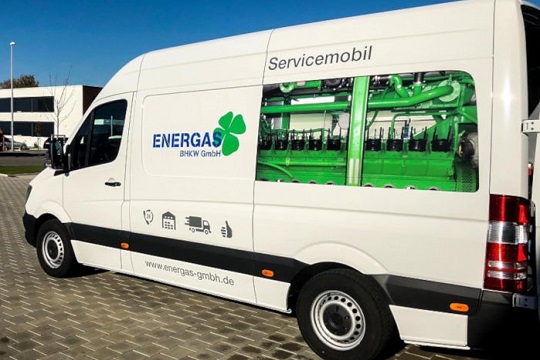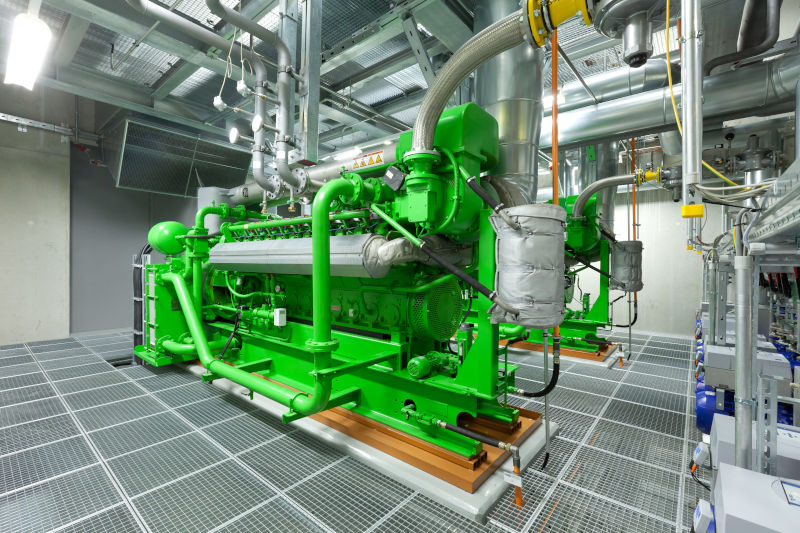About Energas BHKW GmbH
Energas BHKW GmbH, based in Ravensburg, is the provider of ecological energy solutions with efficient combined heat and power (CHP) plants in southern Germany. Together with the branch in Kulmbach, the company currently employs over 85 people and is a subsidiary of the INNIO-Jenbacher Group.
In addition to sales, project planning and commissioning of new CHP modules in the output range between 250 and 10,000 kWel, Energas also offers its customers a comprehensive CHP service from a single source. A professional, fast and reliable all-round service is the quality and differentiating feature among service providers in the CHP sector and is therefore accorded a correspondingly high status within the company.

About the CHP sector
Combined heat and power units (CHP units) can achieve running times of more than 80,000 operating hours if maintenance and servicing measures are carried out correctly (in continuous operation, this corresponds to a period of more than 9 years). Depending on the type or version, maintenance is usually carried out at regular intervals of 2,000 or 3,333 operating hours, meaning that service companies have to coordinate numerous maintenance and servicing assignments within a CHP unit's life cycle.
In addition, both the engine manufacturers and the legislator have extensive documentation requirements. This includes, among other things, compliance with prescribed work depending on the respective maintenance plan levels and the series type, as well as the regular logging of numerous measured values.

The challenge
Incomplete data
The basic data storage and technical documentation was implemented using folders on a network drive. As there was no direct "technical file" on the CHP units, the necessary information was taken from past service reports or from the delivery information from the CHP unit manufacturer Jenbacher.
The search and access times were therefore long and the entire technical master data stock was opaque, as information from several systems had to be laboriously gathered together. In addition, important evaluations could only be carried out with a great deal of manual effort.
Inefficient service process
Another point was the lack of efficiency and susceptibility to errors in the entire operational service process. The deployment planning was mapped using an Excel file. The assembly reports were sent to the Technicians by email in the form of a Word template, filled out on the laptop and reported back by email. The service technicians continued to record the times on a paper service report and had them signed by the customer. The lack of insight into the machine history and the lack of access to technical documentation, such as Circuit diagrams and technical descriptions have complicated troubleshooting on site.
All in all, the entire deployment process caused a high administrative follow-up effort, so that the billing period for the services provided was several weeks in some cases.
"With the introduction of ADASMA, we are underlining our high quality standards as a service provider for Jenbacher gas engines. We are setting new standards in terms of response times and plant documentation in the CHP industry, which leads to increased customer satisfaction."
Jan HaskaService Office Manager
The solution
Complete system history
With the introduction of ADASMA, the entire data management system was first fundamentally restructured and optimized. Each CHP unit is now managed as a separate object and described using freely customizable data fields and components. Associated files (PDF documents, nameplate images, etc.) can now be found directly next to the corresponding object. In addition, all past operations, oil analyses and telephone support are recorded in a clear system history. This drastically reduces search times and all information is now available across all departments. A configurable dashboard with real-time evaluations provides an overview of the status of the system fleet as well as various service and usage indicators.
Improved response times thanks to live data
The service process was raised to a completely new level by integrating all departments and programs involved in the service. The objects are connected to the Jenbacher remote maintenance and analysis portal myPlant via an interface and are thus supplied with live data. ADASMA uses this data to predict maintenance dates with pinpoint accuracy. In addition, a fault ticket is automatically generated for defined events such as system downtimes. New operations are generated at the touch of a button and assigned to the appropriate service technicians via the planning board using drag & drop.
Mobile service app for the Technicians
Technicians have all the necessary operation and object data (system history, past measured values) available offline on the intuitive mobile app. During the operation, the service technicians document their operation-related data with little effort using either the Android or iOS devices and report this back to the control center once they have finished. This completely eliminates the need for coordinators to enter data manually and the billing time is now 1-2 days after completion of the operation. Follow-up work, customer requests and spare parts orders can also be recorded on site via the mobile app and reported back to the head office.
